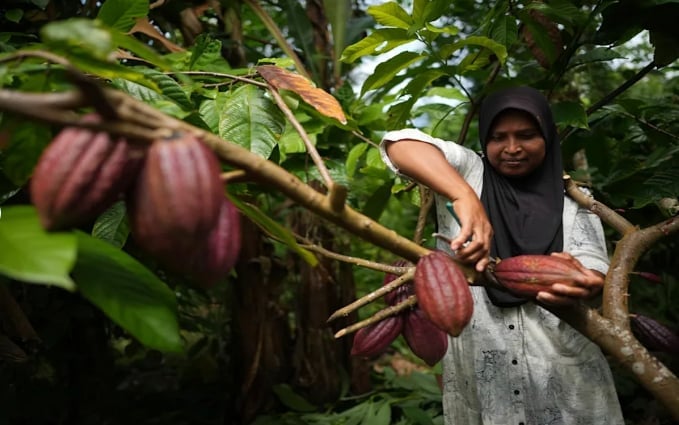December 3, 2025 | 08:56 GMT +7
December 3, 2025 | 08:56 GMT +7
Hotline: 0913.378.918
December 3, 2025 | 08:56 GMT +7
Hotline: 0913.378.918

A farmer picks cocoa pods at a plantation in Tanjung Rejo, Indonesia, Tuesday, Feb. 18, 2025. Photo: Dita Alangkara.
“Now it will help the tree grow new fruit,” farmer Tari Santoso says with a smile.
Thousands of cocoa farmers across Indonesia like Santoso are working with businesses and other organizations to protect their crops from the bitter impacts of climate change and underinvestment that have pushed cocoa prices to record levels.
Cocoa trees are high maintenance: Grown only near the equator, they require a precise combination of steady temperatures, humidity and sunlight. It takes five years for a tree to start producing the seeds that are processed into cocoa used to make chocolate and other delectable foods.
Climate change raises the risks for farmers: Hotter weather hurts yields and longer rainy seasons trigger the spread of fungus and deadly pests. Increasingly unpredictable weather patterns have made it harder for farmers to deal with those challenges.
So farmers are switching to other crops, further reducing cocoa supplies and pushing prices higher: In 2024, prices nearly tripled, reaching about US$12,000 per ton, driving up chocolate costs and leading some chocolate makers to try growing cocoa in laboratories.
Indonesia is the third-largest producer of cocoa in the world, behind Cote D'Ivoire and Ghana, according to the United Nations Food and Agriculture Organization, farmers are joining with businesses and nongovernmental organizations to develop better growing practices and improve their livelihoods.
Sitting in the shade of his forest farm in south Sumatra, 3 miles (5 kilometers) from a national park where Sumatran tigers and rhinos roam, farmer Santoso is working with Indonesian chocolate maker Krakakoa.
After he began working with the company in 2016, Santoso starting using practices that helped his cocoa trees flourish, regularly pruning and grafting new branches onto older trees to promote growth and prevent the spread of disease. He is using organic fertilizer and has adopted agroforestry techniques, integrating other crops and trees such as bananas, dragon fruit, coffee and pepper, into his farm to foster a healthier ecosystem and invest in other income sources.
“It wasn't very successful before we met Krakakoa,” Santoso said. “But then, we received training ... things are much better.”
Krakakoa has trained more than 1,000 cocoa farmers in Indonesia according to its founder and CEO, Sabrina Mustopo. The company also provides financial support.
Santoso and other farmers in Sumatra said the partnership helped them to form a cooperative provides low-interest loans to farmers, with interest paid back into the cooperative rather than to banks outside of the community.
Cocoa farmers who need bigger loans from government-owned banks also benefit from partnering with businesses, as the guaranteed buyer agreements can provide collateral needed to get loans approved, said Armin Hari, a communications manager at the Cocoa Sustainability Partnership, a forum for public-private collaboration for cocoa development in Indonesia.
Dozens of other businesses, the government and nongovernmental organizations and cooperatives are also working with cocoa farmers to better cope with climate change, benefiting thousands, Hari said. He pointed to a collaboration between Indonesia's National Research and Innovation Agency and the local division of international chocolate maker Mars, which have released a new variant of cocoa that produces more pods per tree.
Challenges still remain, said Rajendra Aryal, the FAO's country director for Indonesia. Fewer people see cocoa farming as a lucrative business and instead are planting other crops such as palm oil. And many small-scale farmers still cannot get loans, he said.
But Aryal said he hopes that continued collaboration between farmers and others will help.
“If we can look at the major issues these (farmers) are facing ... I think this sector could be, again, very attractive to the farmers,” he said. “Despite the challenges in Indonesia, I see that there are opportunities."
(AP)

(VAN) Landmark SOLAW 2025 report reminds us that resources for food are not infinite.

(VAN) Climate change is a growing concern for agricultural productivity and several studies have focused on how climate variations can impact crop yields.

(VAN) In today's fast-paced society, with people busy with their work and social lives, many dream about quitting the rat race to experience a slower pace of life, which they imagine as being more poetic.

(VAN) Mindanao’s durian industry is reaping the benefits of rising global demand, with farmers now enjoying improved market access, better farmgate prices, and stronger profitability, the Department of Agriculture in Davao Region (DA-11) reported.

(VAN) Iraq is currently grappling with one of the most severe agricultural and livestock crises in its modern history.

(VAN) The Mediterranean and the Black Sea: Fisheries sustainability concerns remain, but overfishing drops to its lowest level in a decade, while aquaculture feeds more people.

(VAN) Cargill Inc has no plans to close its U.S. beef processing plants, days after meatpacker Tyson Foods l opens new tab announced it would shutter a Nebraska facility as industry grapples with cattle supplies.